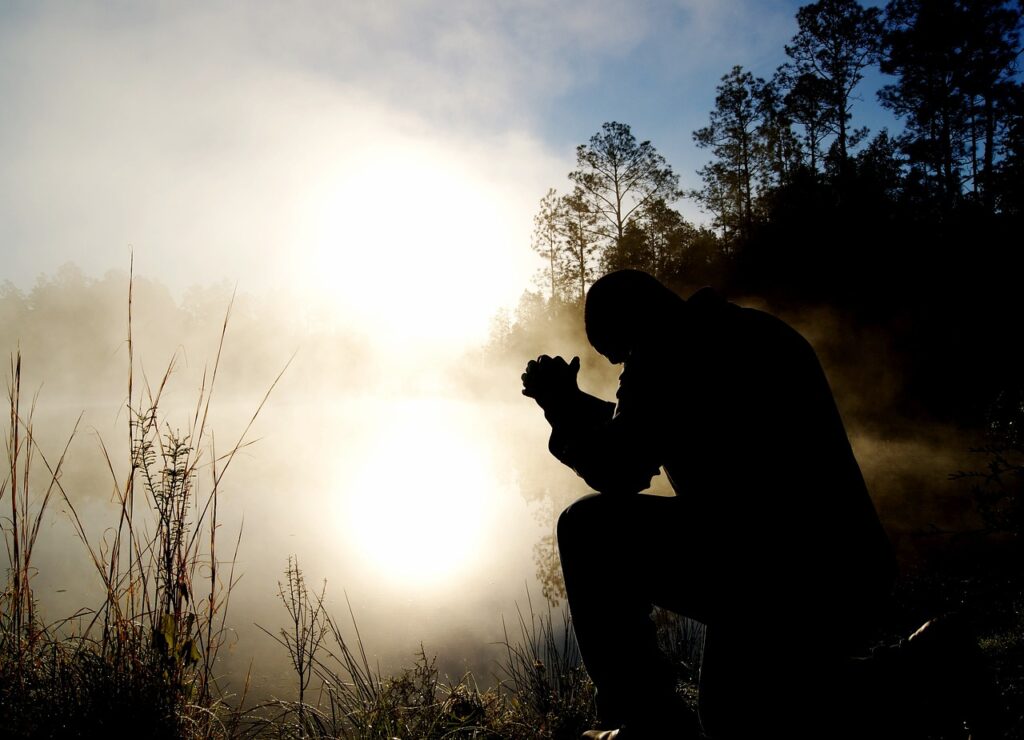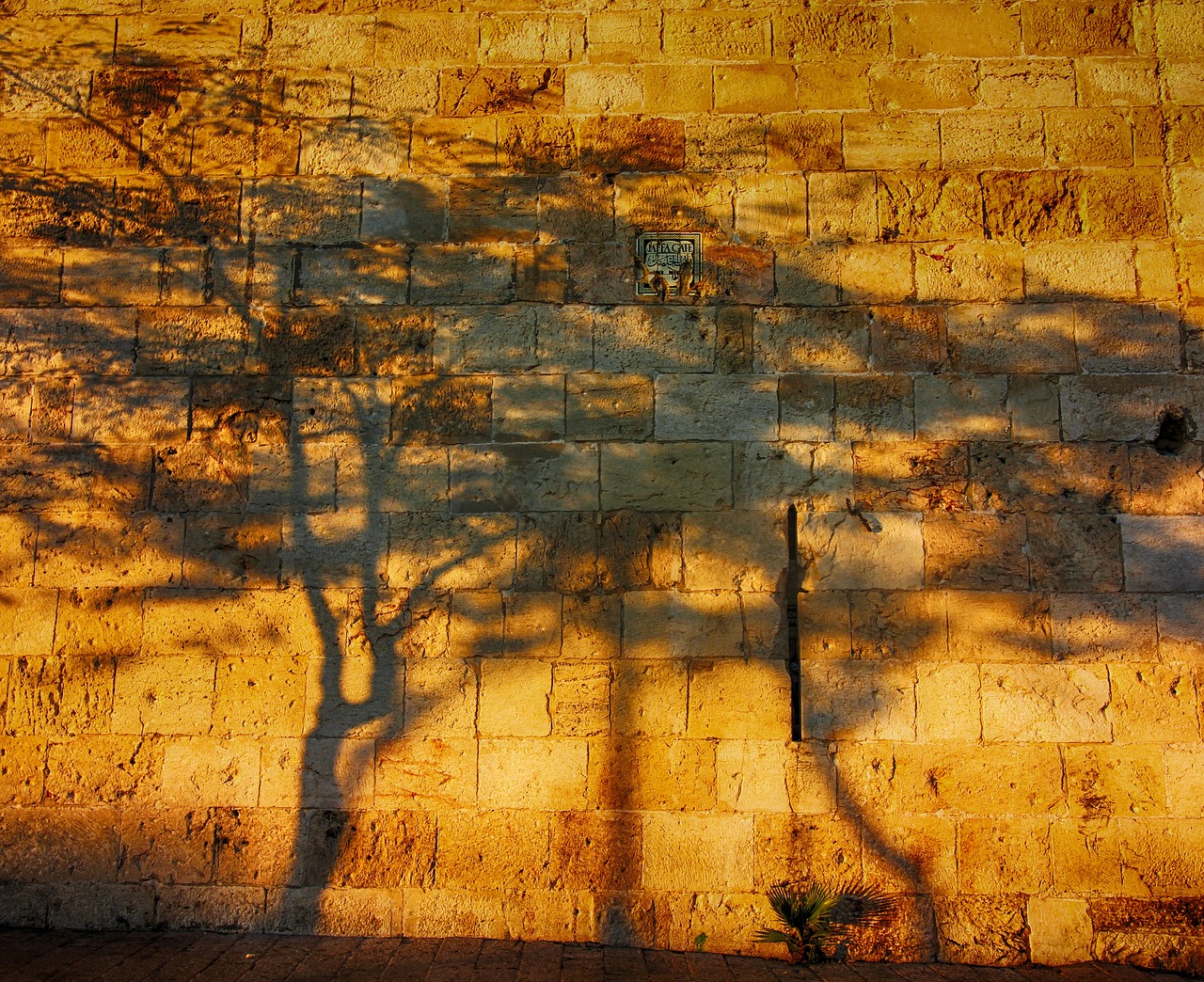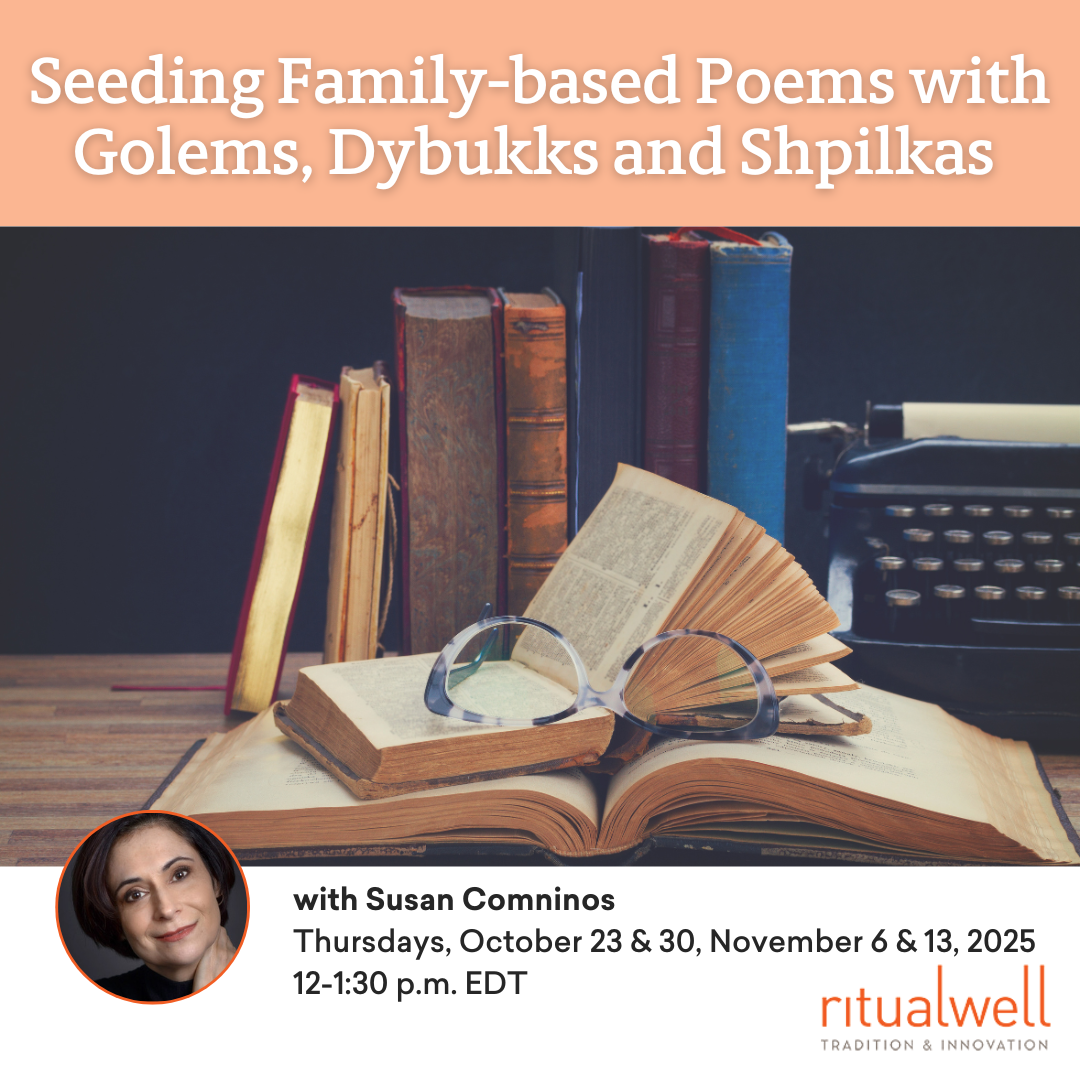We propose a new ritual of creating a daily embodied spiritual practice for the liminal period of Sefirat Ha’Aveilut/the counting of grief, in the nine weeks between Shavuot and Tisha b’Av. We recognize that some Jews and loved ones mark their turning toward grief with a fast on the 17th day of Tammuz, to commemorate the beginning of the siege of Jerusalem. However, for many of us, grief is circular, not linear. Grief often demands of us more time to fully unfold and discern the contours of our loss.
The following is a set of themes, reflections, sacred texts and blessings for each of the 9 weeks of Sefirat Ha’Aveilut. We offer an evocative reflection prompt to spur your engagement with the theme of the week. We have selected texts from Jewish and other spiritual paths, to find your way into the theme. You can engage these tools and practices in a number of ways: prayer, meditation, art, movement, writing, being in nature, song, and silence.
Grieving is more than shared sorrow; it is also collective mourning, purification and taking our first step together of turning toward teshuvah and healing. We reclaim this journey and sanctify the in-between time on the journey from revelation to consolation. Rather than clinging desperately to stale, outworn interpretations and institutions, every generation metabolizes tradition afresh. It is how we make ourselves into a new creation.
Week 1: Foreboding: what happens when we look ahead into the distance, hear an inner rumbling, and sense change is coming
Reflection prompt: When in your life have you felt something rumbling, but didn’t know what it was about? If you’ve ever felt foreboding, but didn’t know how to articulate it, how did you respond?
Text:
נְבִיאַ֗יִךְ חָ֤זוּ לָךְ֙ שָׁ֣וְא וְתָפֵ֔ל וְלֹֽא־גִלּ֥וּ עַל־עֲוֹנֵ֖ךְ לְהָשִׁ֣יב (שביתך) [שְׁבוּתֵ֑ךְ] וַיֶּ֣חֱזוּ לָ֔ךְ מַשְׂא֥וֹת שָׁ֖וְא וּמַדּוּחִֽים׃
Neviayikh hazu lakh shav vetafel velo gilu al avoneikh lehashiv shevutaikh veyekhezu lakh masot shav umadukhim.
The ones who can see – that which is not easily seen — they intuited your distorted and magical thinking. You were not publicly shamed, so as to support and to restore your well-being. But these seers — they did point out your limitations of consciousness. (Lamentations 2:14)
Blessing: Blessed is the Source of Embodied Wisdom, who plants seeds of intuition and guides us with every breath.
Week 2: Descending: beginning to look at what’s not working, noticing where we feel vulnerable, scared, distressed, and afraid
Reflection prompt: What does your tenderness feel like? What or who supports you in order to be present with your vulnerability?
Text:
שִׁמְע֥וּ וְהַאֲזִ֖ינוּ אַל־תִּגְבָּ֑הוּ כִּ֥י ה’ דִּבֵּֽר׃ תְּנוּ֩ לַה’ אֱלֹהֵיכֶ֤ם כָּבוֹד֙ בְּטֶ֣רֶם יַחְשִׁ֔ךְ וּבְטֶ֛רֶם יִֽתְנַגְּפ֥וּ רַגְלֵיכֶ֖ם עַל־הָ֣רֵי נָ֑שֶׁף וְקִוִּיתֶ֤ם לְאוֹר֙ וְשָׂמָ֣הּ לְצַלְמָ֔וֶת (ישית) [וְשִׁ֖ית] לַעֲרָפֶֽל׃ וְאִם֙ לֹ֣א תִשְׁמָע֔וּהָ בְּמִסְתָּרִ֥ים תִּבְכֶּֽה־נַפְשִׁ֖י מִפְּנֵ֣י גֵוָ֑ה וְדָמֹ֨עַ תִּדְמַ֜ע וְתֵרַ֤ד עֵינִי֙ דִּמְעָ֔ה …
Shimu veha’azinu al tigbahu ki Adonai diber. Tenu l’Adonai eloheikhem kavod beterem yakhshikh uvterem yitnagfu ragleikhem al harei nashef vekivitem l’or … vesamah letzalmavet veshit la’arafel. V’im lo tishma’uha bemistarim tivkeh nafshi mipnei gevah vedamo’a tidma v’teirad eini dimah… (Jeremiah 13:15–17)
Listen, attune yourself, without pride; the Divine is speaking. Give yourself over to the Source before it grows dark, and before your feet stumble down the mountains of twilight, and, while you look for light, the Source of Being turns it into shadows of death, and transforms it into darkness. But if you will not listen to it, my soul will weep in secret for your pride; and my eyes will flood, and run down with tears.
Blessing: May you be reminded of God’s unwavering guidance as you navigate the winds of uncertainty.
Week 3: Breaking into shards: cracking open, feeling our tenderness
Reflection prompt: What is the sound of your cracking open? Where do you feel it in your body? Is there an image that comes to mind?
Text:
“True connection requires that a part of us dissolves in order to join with what we meet. This is always both painful and a revelation, as who we are is rearranged slightly, so that aliveness beyond us can enter and complete us. Each time we suffer, each of us is broken just a little, and each time we love and are loved, each of us is beautifully dissolved, a piece at a time. We break so we can take in aliveness and we dissolve so we can be taken in. This breaking and dissolving in order to be joined is the biology of compassion. The way that muscles tear and mend each time we exercise to build our strength, the heart suffers and loves.
Inevitably, the tears of heartbreak water the heart they come from, and we grow.”
—Mark Nepo, excerpt from “Hearing the Cries of the World”
Blessing: May we feel our Sacred Connection in deveikut as we break open to lament and liberation.
Week 4: Crying out
Reflection prompt: How can you give sound or voice to your lamenting cries in order to find freedom there? What is dissolving or being released in your wailing?
Texts:
.ק֣וּמִי ׀ רֹ֣נִּי (בליל) [בַלַּ֗יְלָה] לְרֹאשׁ֙ אַשְׁמֻר֔וֹת שִׁפְכִ֤י כַמַּ֙יִם֙ לִבֵּ֔ךְ נֹ֖כַח פְּנֵ֣י אֲדֹנָ֑י שְׂאִ֧י אֵלָ֣יו כַּפַּ֗יִךְ
Kumi, roni valaila lerosh ashmurot shifkhi khamayim libeikh nokhakh pnei Adonai se’i eilakh kapayikh.
Get up, and cry out in the middle of the night, at the beginning of the day, pour out your broken heart like flowing water in the witnessing presence of the Divine. Lift up your hands to that Source. (Lamentations 2:19)
מִֽן־הַ֭מֵּצַ֥ר קָרָ֣אתִי יָּ֑הּ עָנָ֖נִי בַמֶּרְחָ֣ב יָֽהּ׃
Min hameitzar karati Yah.
Anani bamerkhav Yah.
Anani bamerkhav Yah.
From the Narrow place I called out to God,
who answered me with Divine Expansiveness
(Psalm 118:5)
who answered me with Divine Expansiveness
(Psalm 118:5)
Blessing: Blessed is Yah who hears our cries from the narrow place and meets our longing with love.
Week 5: Touching grief
Reflection prompt: How do you experience collective grief as distinct from individual grief? Where is your grief blocked and where do you feel lost? What sustains or liberates you in communal mourning?
Texts:
גָּדַ֧ר בַּעֲדִ֛י וְלֹ֥א אֵצֵ֖א הִכְבִּ֥יד נְחָשְׁתִּֽי׃ גַּ֣ם כִּ֤י אֶזְעַק֙ וַאֲשַׁוֵּ֔עַ שָׂתַ֖ם תְּפִלָּתִֽי׃ גָּדַ֤ר דְּרָכַי֙ בְּגָזִ֔ית נְתִיבֹתַ֖י עִוָּֽה׃
Gadar ba’adi velo eitzei hikhbid nekhashti. Gam ki ezak va’ashavei’a satam tefilati. Gadar darkhei begazit netivotai ivah.
I have been walled in and cannot break out, I feel weighed down with chains. And when I cry out in despair, I feel my prayer ignored. My path is walled in with rough stone, my path a circuitous maze. (Lamentations 3:7–10)
לית אתר פניו מיניה
Leit atar panui minei
No place is devoid of God’s presence. (Tikkunei Zohar Tikkun 57)
Blessing: May you experience the fullness of grief in the lap of the Beloved.
Week 6: Beginning to see clearly in the loss
Reflection prompt: What scars or remnants of loss do you hold that can be healed afresh? Reflect on a time or a dream in which you found unexpected clarity in the midst of opacity.
Text:
כָּל־עַמָּ֤הּ נֶאֱנָחִים֙ מְבַקְּשִׁ֣ים לֶ֔חֶם נָתְנ֧וּ (מחמודיהם) [מַחֲמַדֵּיהֶ֛ם] בְּאֹ֖כֶל לְהָשִׁ֣יב נָ֑פֶשׁ רְאֵ֤ה יְהוָה֙ וְֽהַבִּ֔יטָה כִּ֥י הָיִ֖יתִי זוֹלֵלָֽה׃
Kol amah ne’enakhim mevakshim lekhem natnu makhamadeihem b’okhel lehashiv nefesh r’ei Havayah vehabitah ki hayiti zolelah.
All the people exhale sadly as they search for nourishment. They have traded their precious valuables for soul sustenance to stay alive. See, Source of Compassion, can you see how devastated I feel? (Lamentations 1:11)
Blessing: Blessed are Shekhinah and Adonai who are our eyes and who help us to see clearly in the storm of grief.
Week 7: Letting go of what we can’t change: releasing our tight grip on suffering
Reflection prompt: Pause and notice where you might be clenching or tightening in your body. Breathe into those places with a kavannah of gentle softening.
Text:
וַיַּעֲבֹ֨ר יְהוָ֥ה ׀ עַל־פָּנָיו֮ וַיִּקְרָא֒ יְהוָ֣ה ׀ יְהוָ֔ה אֵ֥ל רַח֖וּם וְחַנּ֑וּן אֶ֥רֶךְ אַפַּ֖יִם וְרַב־חֶ֥סֶד וֶאֱמֶֽת ׀נֹצֵ֥ר חֶ֙סֶד֙ לָאֲלָפִ֔ים נֹשֵׂ֥א עָוֹן וָפֶ֖שַׁע וְחַטָּאָ֑ה וְנַקֵּה֙
Veya’avor Havaya al panav vayikra Havaya Havaya El rakhum vekhanun erekh apayim verav-hesed ve’emet, notzer hesed la’alafim, nosei avon vafesha vekhata’ah venakei … (Exodus 34:6–7)
And the Source of Being passed by the face (of Moses) and called out: Luminousness, Divine Unfolding, Wellspring of Compassion and Grace, slow to anger, overflowing in kindness and truth, offering lovingkindness to the thousandth generation, forgiving ethical lapses, unskillful behavior and relational mistakes.
Blessing: May our hands, hearts and bodies unfurl to receive Divine compassion and lovingkindness.
Week 8: Accessing our capacity: reminded of our aliveness, feeling resourced
Reflection prompt: Where in nature do you feel most alive? Imagine yourself there right now in your mind’s eye? Drop your awareness down into your heart, your belly, your pelvic bowl, and visualize nature inside your body. Place your hands there and breathe.
Text:
וְקָרָ֨א זֶ֤ה אֶל־זֶה֙ וְאָמַ֔ר קָד֧וֹשׁ ׀ קָד֛וֹשׁ קָד֖וֹשׁ יְהוָ֣ה צְבָא֑וֹת מְלֹ֥א כָל־הָאָ֖רֶץ כְּבוֹדֽוֹ׃
Vekara zeh el zeh v’amar: kadosh, kadosh, kadosh! Havaya tzeva’ot, melo khol ha’aretz kevodo.
And they said one to another, Sacred! Sacred! Sacred!
Havayah is Sacred, and all the earth is full of Divine glory. (Isaiah 6:3)
Havayah is Sacred, and all the earth is full of Divine glory. (Isaiah 6:3)
Blessing: Blessed is the Creator of All That Is, who breathes new life into us in every moment.
Week 9: Repurposing lament: the transformational aspects of grief
Reflection prompt: What are you turning away from and what are you turning toward? Imagine yourself turning toward God in a new way. How might you repurpose or recreate yourself in partnership with God?
Text:
הֲשִׁיבֵ֨נוּ יְהוָ֤ה ׀ אֵלֶ֙יךָ֙ ונשוב [וְֽנָשׁ֔וּבָה] חַדֵּ֥שׁ יָמֵ֖ינוּ כְּקֶֽדֶם׃
Hashiveinu Adonai eilekha, venashuvah. Hadeish yameinu kekedem.
Help us to return to You, O God, then truly shall we return. Renew our days as in the past. (Lamentations 5:1)
Blessing: May we turn and return together in our grief so that we may open more fully to love.
Suggestions
In these nine weeks leading to Tisha b’Av, allow your curiosity and longing to shape a set of spiritual practices with the above resources that might include some of the following:
Internal Reflection
Take some quiet time to notice internally a felt sense of brokenness or a longing for healing. This can include a body scan as well as tuning into your heart and soul. Listen for any thoughts, emotions or felt sensations.
Take some quiet time to notice internally a felt sense of brokenness or a longing for healing. This can include a body scan as well as tuning into your heart and soul. Listen for any thoughts, emotions or felt sensations.
Daily/Weekly Prayer, Ritual or Blessing
Create your own personal blessings for each of the nine weeks of Sefirat Ha’Aveilut. Jot down some notes/ideas/memories about other spiritual journeys you’ve experienced, particularly in preparation for mourning. What elements resonate for you right now? What specific qualities would you like to emphasize? What might you want to say to God?
Create your own personal blessings for each of the nine weeks of Sefirat Ha’Aveilut. Jot down some notes/ideas/memories about other spiritual journeys you’ve experienced, particularly in preparation for mourning. What elements resonate for you right now? What specific qualities would you like to emphasize? What might you want to say to God?
Movement/Embodied Practice
Revelation and lamentation both have deep resonance in the body. Grief and joy reverberate in our limbs, nervous systems, organs and in the breath. Amplify the embodied aspect of grief, healing, prayer, meditation, study, ritual by incorporating movement of some kind. This can be as simple as walking meditation, dance, movement, washing the hands and/or feet, mindful breathing, or laying on of hands with chevruta — all of these enhance the engagement of the physical body in spiritual practice.
Revelation and lamentation both have deep resonance in the body. Grief and joy reverberate in our limbs, nervous systems, organs and in the breath. Amplify the embodied aspect of grief, healing, prayer, meditation, study, ritual by incorporating movement of some kind. This can be as simple as walking meditation, dance, movement, washing the hands and/or feet, mindful breathing, or laying on of hands with chevruta — all of these enhance the engagement of the physical body in spiritual practice.
Creative Expression
What does revelation look like on a canvas? How do we express lament through our hands with a piece of clay or with fingerpainting? Release any internal expectations or judgments about skillful artmaking and simply listen to what wants to be expressed. You don’t need fancy, expensive art supplies; just collecting everyday items like leaves, magazine clippings or other things can be used creatively.
What does revelation look like on a canvas? How do we express lament through our hands with a piece of clay or with fingerpainting? Release any internal expectations or judgments about skillful artmaking and simply listen to what wants to be expressed. You don’t need fancy, expensive art supplies; just collecting everyday items like leaves, magazine clippings or other things can be used creatively.
Journey partners
Invite someone to walk this path of Sefirat ha’Aveilut with you, using some agreements to create a sacred container for the journey (such as these from The People’s Supper or Parker Palmer). Commit to a daily or weekly time for listening, witnessing and inspiring each other without fixing, saving, advising or correcting one another.
Invite someone to walk this path of Sefirat ha’Aveilut with you, using some agreements to create a sacred container for the journey (such as these from The People’s Supper or Parker Palmer). Commit to a daily or weekly time for listening, witnessing and inspiring each other without fixing, saving, advising or correcting one another.
Tikkun Olam Activism
Individual and communal healing are fundamentally intertwined with the healing and repair of the world. Particularly in the current global political climate, what steps could you take toward realizing a vision and dream of our healed world during the nine weeks of Sefirat Ha’Aveilut?
Individual and communal healing are fundamentally intertwined with the healing and repair of the world. Particularly in the current global political climate, what steps could you take toward realizing a vision and dream of our healed world during the nine weeks of Sefirat Ha’Aveilut?
For example, you could learn about a new activist effort and donate time and/or tzedakah to a community organization that is committed to that effort. Another possibility might be to partner with a group from a different cultural or spiritual tradition and have a shared meal together in which you learn together about a social justice issue.
Text Study
Text study is another spiritual practice for this period of Sefirot Ha’Aveilut, especially in chevruta (with a study partner/friend) or in small groups. Sacred texts can include Torah and other Jewish texts as well as inspirational readings from other spiritual and secular sources. You could engage several different readings side by side, such as liturgy from mourning rituals alongside Psalms, Torah or other sacred texts.
Text study is another spiritual practice for this period of Sefirot Ha’Aveilut, especially in chevruta (with a study partner/friend) or in small groups. Sacred texts can include Torah and other Jewish texts as well as inspirational readings from other spiritual and secular sources. You could engage several different readings side by side, such as liturgy from mourning rituals alongside Psalms, Torah or other sacred texts.
Grieving is more than shared sorrow; it is also collective mourning, purification and taking our first step together of turning toward teshuvah. We reclaim this journey and sanctify the in-between time on the journey from revelation to consolation. Rather than clinging desperately to stale, outworn interpretations and institutions, every generation metabolizes tradition afresh. It is how we make ourselves into a new creation.













